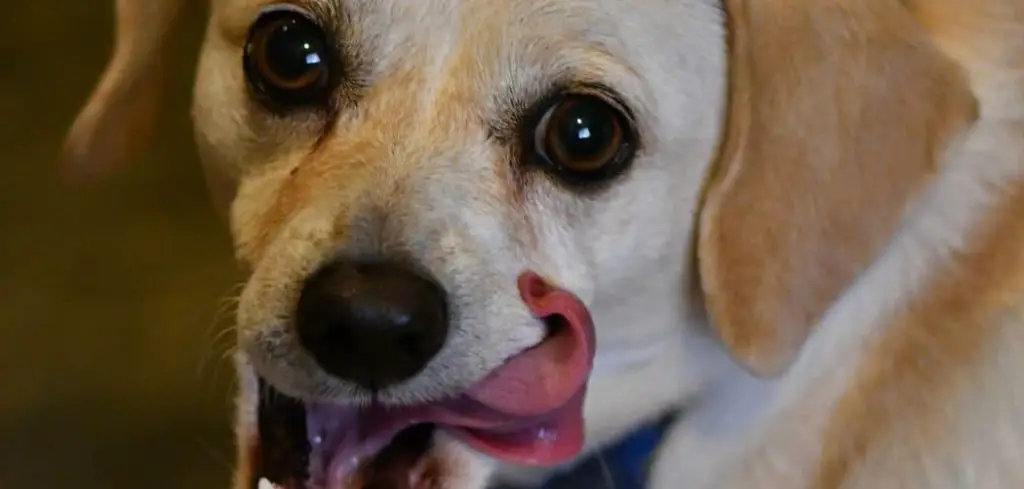It can be worrying to notice your dog drooling or salivating more than usual, especially when it happens at night. While some drool is normal, excessive salivation could signal an underlying health issue that needs attention.
We outline the common causes of excessive salivation in dogs at night, what you can do, and when to seek veterinary help.
Dog Salivating Excessively at Night — Why It Happens
A dog may excessively salivate at night due to dental problems, nausea, heat, or underlying medical conditions. dental problems to digestive upset, nausea, anxiety, or more serious medical conditions. Some dogs may drool in response to acid reflux or an upset stomach, while others may have mouth pain from gum disease or broken teeth.
Anxiety and stress can also increase drooling, especially if the dog feels uneasy at night. In certain cases, neurological disorders, toxin exposure, or systemic illness may also cause nighttime drooling.

Dog Salivating Excessively at Night: Common Causes
Dental Disease
Dental disease is one of the most common reasons dogs salivate excessively. At night, when they are at rest, drool from irritated gums, tartar buildup, or tooth pain can become more noticeable.
You may also see your dog pawing at their mouth, having bad breath, or refusing hard food. Because dental infections can spread to other organs, this is an important cause to take seriously.
Read more: Dog Drooling Excessively at Night (Why it happens)
Nausea or Acid Reflux
Just like people, dogs can experience nausea or acid reflux, which may worsen when they are lying down at night. Saliva production increases as the body attempts to soothe the irritation in the stomach and esophagus.
Other signs may include lip licking, swallowing frequently, eating grass, or vomiting bile in the morning. Chronic reflux can damage the esophagus, making veterinary care essential.
Anxiety and Stress
Some dogs feel more anxious at night, especially if left alone or if there are noises that make them uneasy. Anxiety can trigger excessive drooling, panting, and restlessness.
This kind of nighttime stress may be more common in rescue dogs, older dogs with declining vision or hearing, or dogs experiencing separation anxiety. Stress-related drooling often improves once the underlying anxiety is addressed.
Toxin or Foreign Object Ingestion
Excessive salivation at night could also be caused by your dog chewing or ingesting something toxic or irritating.
Household plants, cleaning chemicals, or even a foreign object stuck in the mouth or throat can lead to drooling.
You might notice pawing at the face, retching, gagging, or difficulty swallowing. This situation can quickly become an emergency, depending on what was ingested.
Neurological Disorders
Conditions that affect the nervous system can interfere with swallowing and saliva control, leading to drooling. Seizure activity, even mild or partial seizures at night, may cause foaming or excessive salivation.
Other symptoms may include tremors, unusual movements, or confusion. Neurological causes of drooling require immediate veterinary evaluation.
Heat and Overheating
Even at night, some dogs may struggle with heat. Overheating triggers panting and drooling as the body tries to regulate temperature.
Dogs with thick coats, brachycephalic breeds like Bulldogs and Pugs, or overweight dogs are more prone to this.
If your dog is restless, panting, and drooling excessively in a warm room, overheating may be the cause. Keeping them cool and hydrated is critical.
Read more: Dog Drooling and Licking Excessively at Night (Explained)
What to Do If Your Dog Is Salivating Excessively at Night
If your dog suddenly begins drooling more than usual at night, start by checking their mouth for obvious signs of dental issues, stuck objects, or irritation. Wiping the drool and monitoring closely for other symptoms can help you track whether the problem persists.
Offering fresh water can ease discomfort if the issue is mild reflux or mild overheating. Keeping your dog in a calm, cool environment can also reduce stress and heat-related drooling.
If anxiety seems to be a trigger, try offering comfort with a familiar blanket, low lighting, or white noise to ease nighttime stress. Some owners find that sticking to a consistent nighttime routine helps calm anxious dogs.
Dietary adjustments, such as feeding smaller meals earlier in the evening, may help dogs with reflux. However, long-term or worsening symptoms always require veterinary evaluation.
When to Call or Visit Your Vet
Excessive nighttime salivation should not be ignored if it happens often, worsens suddenly, or comes with other troubling symptoms.
Seek veterinary care if your dog is also vomiting, gagging, pawing at their mouth, or having difficulty swallowing. Any sign of toxin ingestion, foreign object, or seizure-like activity is an emergency.
If drooling is paired with bad breath, weight loss, refusal to eat, or facial swelling, it may point to dental disease or infection that requires prompt treatment.
You should also call your vet if your dog shows signs of overheating, such as heavy panting, bright red gums, or collapse, even if it happens at night. Heatstroke can be life-threatening.
Read more: Dog Excessively Salivating (Causes and solutions)
Key Takeaway
Dog salivating excessively at night can be caused by something as simple as anxiety or heat, but it may also point to more serious issues like dental disease, reflux, toxin ingestion, or neurological conditions.
Monitoring your dog, making small adjustments at home, and knowing when to call the vet are all important steps.
If you’re ever unsure, it’s always safest to have your dog checked by a veterinarian. Quick action can make all the difference in keeping your dog healthy and comfortable.
